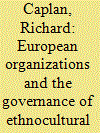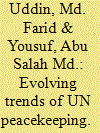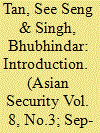|
|
|
Sort Order |
|
|
|
Items / Page
|
|
|
|
|
|
|
| Srl | Item |
| 1 |
ID:
133959


|
|
|
|
|
| Publication |
2014.
|
| Summary/Abstract |
The post-Cold War period to date has witnessed renewed international and especially European preoccupation with issues pertaining to ethnocultural diversity and the challenges for governance arising from these issues. This article discusses the shift that has occurred in support of national minority rights in Europe and why European organizations have become more concerned with these rights after the Cold War. It examines some of the major policy initiatives adopted by European organizations in response to the nearly 25-year long Yugoslav crisis and what these initiatives reveal about new (and old) thinking within these organizations with respect to national minority rights and the management of ethnocultural diversity more generally. It also discusses the consequences of these initiatives for minority rights protection and some of their broader implications for European policy in the future.
|
|
|
|
|
|
|
|
|
|
|
|
|
|
|
|
| 2 |
ID:
134109


|
|
|
|
|
| Publication |
2014.
|
| Summary/Abstract |
Peacekeeping has emerged as one of the core activities of the United Nations (UN). Due to ground realities, the doctrines, principles and structures of peacekeeping have evolved in accordance with necessity. In the traditional phase, during the Cold War era, peacekeeping was mostly limited to monitoring and observation affairs. In the post-Cold War era, there was an expansion of peace operations and "minimum use of force", where necessary, emerged as an acceptable norm of peacekeeping. In the consolidation phase, after 2000, peace operations emphasised on peace building affairs i.e., democratisation, institution building, security sector reform (SSR) and human rights protection. The phase of New Horizon, which started in 2009 indicating changing trends, focuses mainly on development, capacity building, planning and oversight. It can be argued that the future peace operations are going to be more robust and multidimensional, and would concentrate on responsibility to protect civilians, human rights and environmental issues, gender mainstreaming, democratisation and institution building to achieve sustainable peace in the conflicting areas. Being a leading troops contributing country, Bangladesh will face new challenges to adapt with the emerging trends of UN peace operations. The challenges include dealing with new doctrinal issues and capacity building of its peacekeepers in the field level. In this respect, the main objectives of this paper are to understand the changing trends of UN peacekeeping and to identify potential challenges for Bangladesh and its likely responses in the coming days to continue its contributions in the UN peace operations.
|
|
|
|
|
|
|
|
|
|
|
|
|
|
|
|
| 3 |
ID:
116366


|
|
|
|
|
| Publication |
2012.
|
| Summary/Abstract |
Defense diplomacy is a relatively new phenomenon aimed at addressing the strategic complexity and uncertainty of the post-Cold War world. It has hitherto received little analytical attention where defense relations in Southeast Asia are concerned. Our article seeks to redress that lack. Borrowing from historical and contemporary debates on diplomacy, we offer a working definition of defense diplomacy that distinguishes its pragmatic and transformative aspects. Building on the four articles that follow, we suggest that bilateral and multilateral engagements in defense diplomacy by Asian countries have primarily been pragmatic in form and function, aimed at maintaining peaceful and stable regional relations. Our modest contribution is hopefully a useful start to what could in time become a meaningful debate and cumulative knowledge on defense diplomacy.
|
|
|
|
|
|
|
|
|
|
|
|
|
|
|
|
| 4 |
ID:
060933


|
|
|
|
|
| Publication |
London, Royal Institute of international Affairs, 1993.
|
| Description |
v. 2(x, 98p.)
|
| Contents |
V.2. Prospects for global order
|
| Standard Number |
0905031652
|
|
|
|
|
|
|
|
|
|
|
|
Copies: C:1/I:0,R:0,Q:0
Circulation
| Accession# | Call# | Current Location | Status | Policy | Location |
| 037276 | 355.03/SAT 037276 | Main | On Shelf | General | |
|
|
|
|
|
|
|
|
|